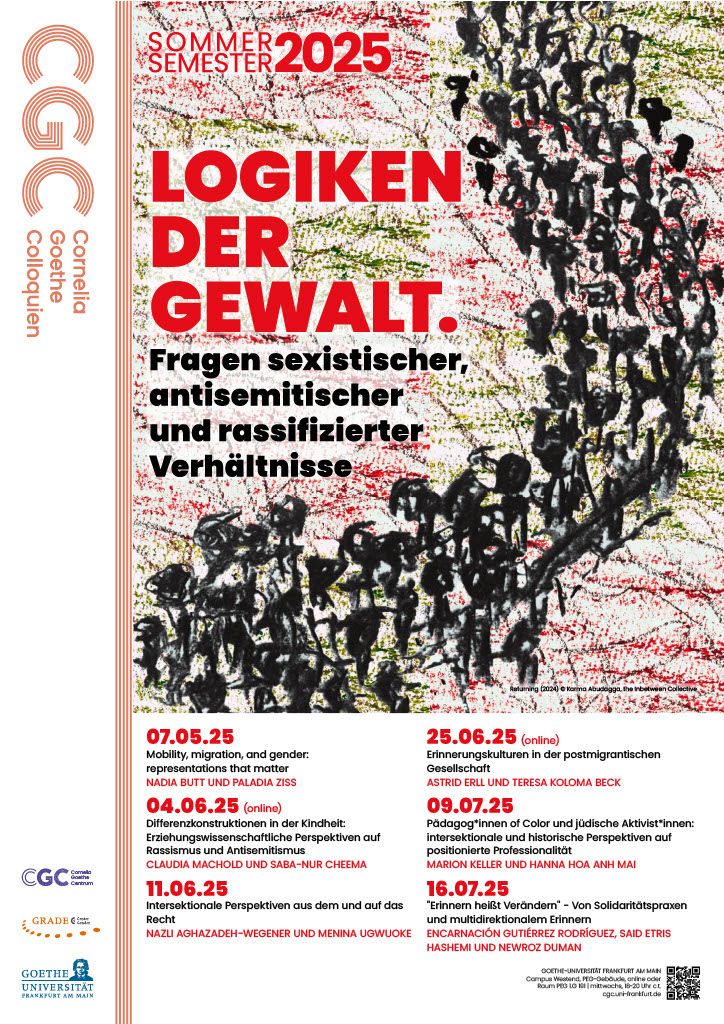
Room 1.G191
The room is accessible via elevators. There are two accessible restrooms on the first floor (1.G40s and 1.G40h).
On the same floor, there is an all-gender restroom (1.G40n) with both urinals and seated toilets. Additionally, there is a FLINTA* restroom (2.G40q) on the second floor, close to the CGC office rooms.
Encarnación Gutiérrez Rodríguez
Decolonial Mourning: Entangled Grief and Reparative Justice
This talk understands decolonial mourning as an articulation of resistance against colonial and migranticizing necropolitics. Necropolitics is discussed here as the underside of social reproduction and, moreover, as constitutive of it. While necropolitical social reproduction might sound like an oxymoron, this concept can be made productive for understanding the relationship between the systemic creation and destruction of life—particularly in the context of the systematic letting die and killing of colonized, feminized, sexualized, disabled, racialized, migrantized, impoverished, and abandoned bodies. I develop my argument in three steps: First, I undertake an analysis of violence by examining feminicides and the Argentine movement #Ni Una Menos through the lens of political mourning. Second, following the political theorist Gladys Tzul Tzul, we will engage with communal resistance to genocidal and extractivist racial capitalism. Finally, we will turn our attention to current intersections of coloniality and migration in the German context, and conceptualize decolonial mourning as the creation of a convivial infrastructure aimed at resisting necropolitical social reproduction.
Said Etris Hashemi und Newroz Duman
To Remember Is to Change
For five years, we have said their names. For five years, we have remembered. For five years, we have tirelessly fought for remembrance, justice, truth, and consequences.Even though much has not been addressed or has remained without consequences, we still believe that change is possible. We trust in the power of solidarity. Without the solidarity of others affected, right from the beginning, we would not have been able to achieve what we have. Since Hanau, this country remembers differently. Under #saytheirnames, the names are visible everywhere—there are memorial sites, graffiti, and stickers. We remember the victims, not the perpetrator. What does remembrance mean locally, on the ground?
Hanau has become a symbol of far-right terror and violence—but also a place of remembrance and of life. To remember is to change. We do all this not for ourselves, but for society as a whole. So that the racism that runs rampant everywhere might lessen. For life, against fear.

Encarnación Gutiérrez Rodríguez is a Professor in Sociology with a focus on Culture and Migration at the Goethe University, Frankfurt/Main. Previously to this position, she was Professor in General Sociology at the Justus-Liebig-University Giessen. Moreover, she is an Adjunct Professor in Sociology at the University of Alberta, Canada, and Visiting Professor in CRISHET – Chair for Critical Studies in Higher Education Transformation, Nelson Mandela University, South Africa. In 2020/21, she was a Digital Senior Fellow in Maria Sibylla Merian Centre: Conviviality-Inequality in Latin America (Mecila), São Paulo. She has been an early and staunch advocate of decolonial critique in the German-speaking world. More recently she has published the monographe Decolonial Mourning and the Caring Commons (Anthem 2023); and with Shirley Anne Tate the Palgrave Handbook in Critical Race and Gender (Palgrave 2022), with Rhoda Reddock Decolonial Perspectives on Entangled Inequalities: Europe and the Caribbean (Anthem, 2021) and with Pinar Tuzcu Migratischer Feminismus in der deutschen Frauenbewegung, 1985-2000 (assemblage 2021).

Said Etris Hashemi, born in 1996 in Hanau, is an author and the son of Afghan refugees. In 2024, he published his autobiographical book “Der Tag, an dem ich sterben sollte. Wie der Terror in Hanau mein Leben für immer verändert hat”. On February 19, 2020, Hashemi became a victim of the far-right terrorist attack in Hanau, in which his younger brother, Said Nesar, and several others were killed. Hashemi narrowly survived and has since been actively campaigning against racism, discrimination, and for greater justice in Germany. He lives and works in Hanau.

Newroz Duman, anti-racism and empowerment activist, trauma pedagogue, spokesperson for the Initiative 19th February Hanau, and project staff member at the Competence Network on Anti-Muslim and Anti-Islamic Hate within the Association of Binational Families and Partnerships in Leipzig.
This event takes place in German.
The CGC strives to make its events as accessible as possible. If you require assistance in order to participate in our event, please let us know your support needs by 25 June 2025 via email at: cgcentrum@soz.uni-frankfurt.de. We will then do our best to reduce any barriers within the scope of our capabilities. You are also welcome to attend this event with your children. If you would like us to arrange childcare, please contact us at the above email address at least one month before the event. We look forward to your participation.

